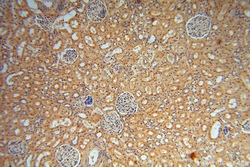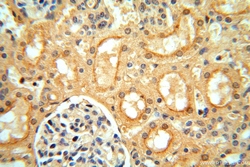Antibody data
- Antibody Data
- Antigen structure
- References [7]
- Comments [0]
- Validations
- Western blot [1]
- Immunohistochemistry [2]
Submit
Validation data
Reference
Comment
Report error
- Product number
- 16364-1-AP - Provider product page

- Provider
- Proteintech Group
- Proper citation
- Proteintech Cat#16364-1-AP, RRID:AB_2213571
- Product name
- VAV1 antibody
- Antibody type
- Polyclonal
- Description
- KD/KO validated VAV1 antibody (Cat. #16364-1-AP) is a rabbit polyclonal antibody that shows reactivity with human and has been validated for the following applications: IHC, IP, WB,ELISA.
- Reactivity
- Human
- Host
- Rabbit
- Conjugate
- Unconjugated
- Isotype
- IgG
- Vial size
- 20ul, 150ul
Submitted references ALKBH5 is a prognostic factor and promotes the angiogenesis of glioblastoma.
Vav1 promotes inflammation and neuronal apoptosis in cerebral ischemia/reperfusion injury by upregulating microglial and NLRP3 inflammasome activation.
STING pathway contributes to the prognosis of hepatocellular carcinoma and identification of prognostic gene signatures correlated to tumor microenvironment.
Adult astrocytes from reptiles are resistant to proinflammatory activation via sustaining Vav1 expression.
Multiple regulatory aspects of histone methyltransferase EZH2 in Pb-induced neurotoxicity.
Vav1 expression is increased in esophageal squamous cell carcinoma and indicates poor prognosis.
Novel role of Vav1-Rac1 pathway in actin cytoskeleton regulation in interleukin-13-induced minimal change-like nephropathy.
Fan Y, Yan D, Ma L, Liu X, Luo G, Hu Y, Kou X
Scientific reports 2024 Jan 14;14(1):1303
Scientific reports 2024 Jan 14;14(1):1303
Vav1 promotes inflammation and neuronal apoptosis in cerebral ischemia/reperfusion injury by upregulating microglial and NLRP3 inflammasome activation.
Qiu J, Guo J, Liu L, Liu X, Sun X, Chen H
Neural regeneration research 2023 Nov;18(11):2436-2442
Neural regeneration research 2023 Nov;18(11):2436-2442
STING pathway contributes to the prognosis of hepatocellular carcinoma and identification of prognostic gene signatures correlated to tumor microenvironment.
Pu Z, Liu J, Liu Z, Peng F, Zhu Y, Wang X, He J, Yi P, Hu X, Fan X, Chen J
Cancer cell international 2022 Oct 12;22(1):314
Cancer cell international 2022 Oct 12;22(1):314
Adult astrocytes from reptiles are resistant to proinflammatory activation via sustaining Vav1 expression.
Du N, Li H, Sun C, He B, Yang T, Song H, Wang Y, Wang Y
The Journal of biological chemistry 2021 Jan-Jun;296:100527
The Journal of biological chemistry 2021 Jan-Jun;296:100527
Multiple regulatory aspects of histone methyltransferase EZH2 in Pb-induced neurotoxicity.
Xue WZ, Gu X, Wu Y, Li D, Xu Y, Wang HL
Oncotarget 2017 Oct 17;8(49):85169-85184
Oncotarget 2017 Oct 17;8(49):85169-85184
Vav1 expression is increased in esophageal squamous cell carcinoma and indicates poor prognosis.
Zhu X, Jin H, Xia Z, Wu X, Yang M, Zhang H, Shang X, Cheng R, Zhan Z, Yu Z
Biochemical and biophysical research communications 2017 Apr 29;486(2):571-576
Biochemical and biophysical research communications 2017 Apr 29;486(2):571-576
Novel role of Vav1-Rac1 pathway in actin cytoskeleton regulation in interleukin-13-induced minimal change-like nephropathy.
Chan CY, Ng KH, Chen J, Lu J, Lee CG, Tan PH, Jordan SC, He HY, Yap HK
Clinical science (London, England : 1979) 2016 Dec 1;130(24):2317-2327
Clinical science (London, England : 1979) 2016 Dec 1;130(24):2317-2327
No comments: Submit comment
Supportive validation
- Submitted by
- Proteintech Group (provider)
- Main image

- Experimental details
- Jurkat cells were subjected to SDS PAGE followed by western blot with 16364-1-AP(VAV1 antibody) at dilution of 1:300
- Sample type
- cell line
Supportive validation
- Submitted by
- Proteintech Group (provider)
- Main image

- Experimental details
- Immunohistochemical of paraffin-embedded human kidney using 16364-1-AP(VAV1 antibody) at dilution of 1:50 (under 10x lens)
- Sample type
- tissue
- Submitted by
- Proteintech Group (provider)
- Main image

- Experimental details
- The VAV1 antibody from Proteintech is a rabbit polyclonal antibody to a recombinant protein of human VAV1. This antibody recognizes human, mouse, rat antigen. The VAV1 antibody has been validated for the following applications: ELISA, WB, IHC analysis.
 Explore
Explore Validate
Validate Learn
Learn Western blot
Western blot ELISA
ELISA